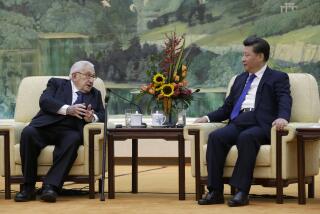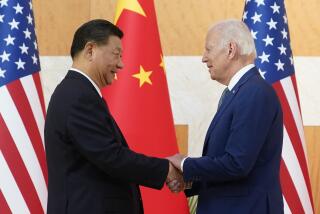Beijing Holds Door Open for Secretary of State
- Share via
BEIJING — After an era of frenzied Maoist xenophobia, Deng Xiaoping opened the door to closer U.S.-China relations when he came to power in 1979.
Now that China’s senior leader has died, his successors are making an extra effort to ensure that the door does not shut.
Despite a critical period of national mourning and political transition, the Beijing leadership has decided to go ahead with a visit Monday by new Secretary of State Madeleine Albright that falls on the eve of a massive memorial service for Deng.
In the last stop of her inaugural world tour as the United States’ chief envoy, Albright is expected to meet Monday afternoon and night with China’s top leaders, including President Jiang Zemin.
She is scheduled to leave Tuesday morning only an hour before Jiang presides over the memorial service for Deng at the Great Hall of the People here in Beijing. No foreign dignitaries have been invited to the nationally televised memorial that will be attended by 10,000 senior Communist Party officials.
Diplomats in Beijing see the Albright visit as an important opportunity to gauge the direction in which the world’s most populous country is heading in the post-Deng era. Albright will be the first senior official from a major country to meet with the Chinese leadership after Deng’s death.
“The hope is that Secretary Albright appreciates the importance of the moment,” one diplomatic source said. “It is something that [former Secretary of State] Henry Kissinger, with his strong sense of history, would have relished.”
In Washington, China’s ambassador to the U.S., Li Daoyu, underlined the importance of the Albright talks, the first of several high-level Sino-U.S. meetings that will culminate in an exchange of summits between the two countries’ presidents.
“It is time both countries meet the challenge of history and work to bring a stable, healthy Sino-U.S. relationship into the 21st century,” Li said.
Vice President Al Gore is scheduled to visit Beijing at the end of March.
On Friday, Gore visited the Chinese Embassy in Washington, delivering condolences on behalf of the U.S. government and standing in silence for one minute before a photograph of Deng, who died Wednesday.
In a summit long sought by Chinese authorities, Jiang is tentatively scheduled to make his first state visit to Washington to meet with President Clinton in November. Clinton has said he wants to visit Beijing early next year.
In addition to helping Jiang establish himself as Deng’s rightful replacement at the helm of Chinese power, the summits will be the first since relations became strained after the Chinese army crackdown on pro-democracy protesters in Beijing’s Tiananmen Square in 1989. They represent an important element of the Clinton administration’s policy of “constructive engagement” with the Chinese regime.
Signaling that relations between the nations’ militaries are also on the mend in the post-Deng era, military attaches at the U.S. Embassy in Beijing participated last week in a send-off ceremony for three Chinese navy destroyers and an auxiliary ship as they set sail from the navy base at Xiamen on their way to port calls in the United States.
The ships will arrive in Hawaii on March 9 and in San Diego on March 21.
Meanwhile, in Beijing on Saturday, uniformed pallbearers went through a dress rehearsal for Deng’s funeral at Babaoshan, the Beijing cemetery reserved for revolutionary heroes. Deng’s body will be cremated at the cemetery. At the request of his family, the leader’s ashes will then be scattered in the sea.
Hong Kong television stations showed footage of seven soldiers carrying a glass casket with a soldier lying inside, an apparent simulation of rites for Deng.
Public displays of mourning were strictly limited in the capital, where officials fear they might turn into the same kind of mass demonstrations that followed the death of Premier Chou En-lai in 1976 and former Communist Party General Secretary Hu Yaobang in April 1989. Hu’s death precipitated the massive student demonstrations in Tiananmen Square that year.
Outside Beijing, however, there were fewer restraints.
In Shanghai’s Jade Buddha Temple, monks prayed for the late Chinese leader.
“The monks are praying for world peace and Deng Xiaoping,” a temple attendant told Reuters.
More to Read
Sign up for Essential California
The most important California stories and recommendations in your inbox every morning.
You may occasionally receive promotional content from the Los Angeles Times.










